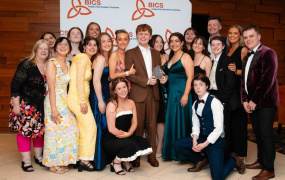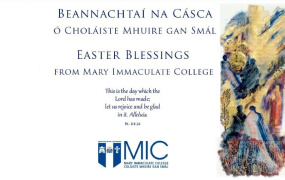Search
Use search box below to look for information on the Mary Immaculate College website. There are some helpful links to common search queries above it. Keep an eye out for the 'Ask a Question' function on certain pages and sections where you can pose specific queries to MIC staff (and see previous questions and answers underneath the question box).
John O’Neil is studying for his PhD in the Department of Psychology at MIC. He tells us about his really interesting research topic, which delves into the concept of vulnerability in professional Football. His study aims to enhance our understanding of vulnerability across all roles in the football landscape, from players to directors and various departments within.
The MIC Ability Pathways (MAP) Project aims to provide a pathway to meaningful community engagement for people with intellectual disability, in an inclusive third level environment which has an established history of educational excellence and community inclusion. The project aims to provide education, training and meaningful employment opportunities for people with an intellectual disability who are committed to lifelong learning.
A film festival founded by Mary Immaculate College (MIC) academic, Dr Susan Liddy, is set to return to Limerick this week, with an exciting programme dedicated to amplifying underrepresented voices in film.
The Catalyst International Film Festival (CIFF)—which promotes and prioritises films, debates and workshops from sidelined groups—will run from 3 to 5 April at a number of venues in Limerick but primarily in the Belltable Theatre.
According to Dr Liddy of the Department of Media & Communications Studies, who is also the festival Director and the President of Women in Film & Television International, CIFF is dedicated to creating a more inclusive film industry embracing a range of voices and experiences.
Dr Rebecca Purcell has been appointed Head of the newly established Business and Accounting Department at Mary Immaculate College (MIC).
Rebecca has been with MIC since 2016 as a lecturer in Business Studies in the Faculty of Arts and School of Post-Primary Education, MIC Thurles—following the incorporation of St Patrick’s College in Thurles by MIC. Prior to joining St Patrick’s College, she lectured in the University of Limerick and Tipperary Institute.
A Mary Immaculate College (MIC) academic has been awarded €300,000 in funding to lead the Irish stage of a European project aiming to boost the transformation towards a climate neutral, sustainable, productive and competitive ‘Blue Economy’.
MIC academic Dr Anne Dolan has been awarded New Foundations funding by the Irish Research Council (IRC) to support her research and work in promoting climate change in teacher education at post-primary level.
A Mary Immaculate College (MIC) academic has been jointly awarded the John Coolahan SCoTENS Award for 2023 in recognition of her research into the experiences of non-religious teachers in Post-Primary schools. Dr Catherine Stapleton, Lecturer in Education at MIC, Thurles is co-author of the ‘Non-Religious Teachers in Schools with a Religious Ethos in the Republic of Ireland and Northern Ireland: Experiences of Recruitment and Promotion Processes’ report, alongside Dr James Nelson from Queen’s University Belfast (QUB).
Mary Immaculate College (MIC) academic, Dr Ailbhe Kenny, has been awarded a highly prestigious Irish Research Council (IRC) Starting Laureate Award. Under the scheme, announced today (Monday) by Minister for Further & Higher Education, Simon Harris TD, Dr Kenny is awarded €400,000 to conduct a four-year project investigating the role music plays within intercultural school encounters for children and young people from an asylum seeking or refugee background.
There are high hopes that human remains, which were found at the site of an ancient church in Belgium, could be those of Irish war hero Patrick Sarsfield. The Sarsfield Homecoming Project, launched in November 2020 by Dr Loïc Guyon, Honorary Consul of France and Head of the Department of French Studies at Mary Immaculate College (MIC), Limerick, has spent the past number of years locating and repatriating the remains of national hero Patrick Sarsfield to Ireland.
Sarsfield is best known for his defence of Limerick against the forces of William of Orange in 1690, in an event now known as the Siege of Limerick. Sarsfield, fighting for King James II, was eventually defeated; however, he helped negotiate the famous Treaty of Limerick, which ended the Williamite War in Ireland and from which Limerick gets its nickname as the ‘Treaty City’. After signing the Treaty of Limerick in 1691, Patrick Sarsfield then emigrated to France, with thousands of his soldiers, and enrolled in the army of the King of France, Louis XIV, to continue the fight against William of Orange and his allies. It was while fighting in the service of France that he was fatally wounded at the Battle of Landen in July 1693. Conflicting versions of the circumstances of his death meant that the location of his burial had remained a mystery up until recently.
A new book from MIC academic Dr Eóin Flannery explores how leading literary voices in contemporary Irish writing engaged with the events of Ireland’s turn-of-the-century economic ‘boom’ and the demise of the Celtic Tiger, and how they have portrayed the widespread and contrasting aftermaths. Form, Affect and Debt in Post-Celtic Tiger Irish Fiction is a fascinating analysis of the work of writers such as Donal Ryan, Anne Haverty, Claire Kilroy, Dermot Bolger, Deirdre Madden, Chris Binchy, Peter Cunningham, Justin Quinn, and Paul Murray.
MIC lecturer, Dr Susan Liddy of the Department of Media & Communications Studies, has co-authored the first report on harmful behaviours and practices within the Irish screen industries.
Recently launched Light House Cinema in Dublin, Behind the Scenes: Exploring harmful behaviours in the Irish screen industries. The report takes a quantitative and qualitative approach, capturing the anonymised voices of respondents to convey their experiences across a range of industry roles and workplaces. The report’s launch on 30 September attracted industry organisations, third level institutions, screen executives and individual filmmakers. Attendees at the launch included Screen Ireland, Coimisiún na Méan, the National Women’s Council of Ireland, SIPTU, Writers Guild of Ireland, Screen Producers Ireland, Screen Guilds of Ireland, TUS Dublin and Trinity College.
The launch included a panel discussion with Susan, Jessica Drum (Screen Guilds of Ireland), Colman Farrell (Screen Ireland), Ananta Kaur (Screen Producers Ireland), and Niamh O’ Donnell (Safe to Create) and afterwards, a Q&A session focusing on how to collectively foster a safer, more supportive work environment for all. The event was moderated by journalist, Aoife Barry.
MIC history lecturer Dr Miriam Nyhan has released a new volume evaluating the work of renowned Irish historian Joe Lee.
A Tract for Our Times: A Retrospective on Joe Lee's Ireland 1912–1985 brings together a number of leading historians to assess the impact of her former colleague, Professor Joe Lee, and his writing on contemporary Irish history and historiography.










